Most homesteading families and preppers have cows, chickens, rabbits, or goats as a part of their farm, but a new livestock favorite is now emerging across the United States – the mini donkey. Miniature donkeys are not only as lovable as a new puppy, they can pull a cart and perhaps most importantly, keep a deadly predator away from your other livestock, too. Sweet treats are just about the only thing mini donkeys enjoy more than attacking coyotes.
Miniature Donkeys For Your Homestead: Little Powerhouse
The mini donkeys instinctively behave in an aggressive manner towards predators. Although they do not have the size nor the teeth to kill a large predator or fend off a tack against multiple coyotes, they definitely serve as a great deterrent and alert the livestock guardian dogs on the homestead or survival retreat that danger has arrived and their services are needed to finish off any intruder that did not heed their warning.
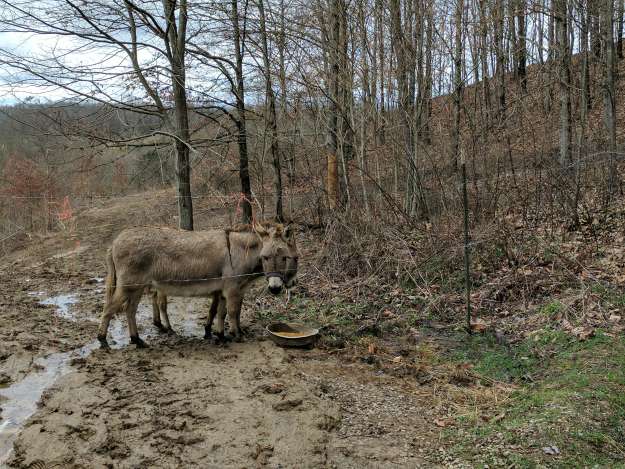
They don't eat much by way of feed and typically live at least 35 years – making them easy and affordable keepers. Before just a few years ago mini donkeys were merely thought of as cute pets to occasionally ride the kiddos around on for fun.
Mini donkeys typically measure between 31 to 35 inches tall and weigh between 250 to 350 pounds. The height at the withers of the breed has shrunk by about three inches since the animals were first imported into the country.
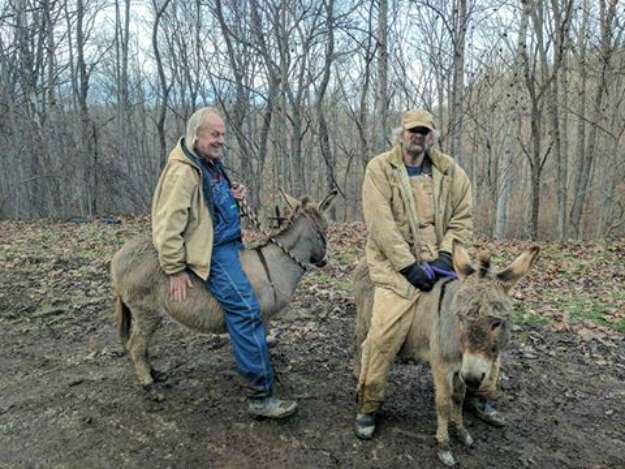
These little powerhouses are perfect for a survival retreat or off the grid homestead. They can pull a cart long distances and over very rugged terrain – like a goat-only type of ground. Miniature donkeys are sure-footed and although female minis don't tend to like mud, they can slug through it without getting stuck or panicking.
Unlike mules, miniature or otherwise, the little donkeys are affable creatures and take direction well. The breed originated in Sicily and Sardinia and are sometimes referred to as Mediterranean or Sardinian donkeys. Villagers in the region frequently utilized the strength and tenacity of the mini donkeys to their benefit. The compact members of the equine family could often be seen hauling heavy supplies up into the mountain region and walking in circles for hours on end to power grindstones.
When the Mediterranean donkeys first arrived in the United States during the 1920s, they were dubbed “dinky donkeys” by curious onlookers and breeders. NYC stockbroker Robert Green so admired the intelligence, affectionate, and durable character of the breed he spent a significant amount of money bringing a herd onto American soil.
Importation of the mini donkeys continued at a steady pace well into the 1960s in an effort to fully establish the breed in the United States. Today there are about 50,000 known miniature donkeys roaming in pastures around the country.
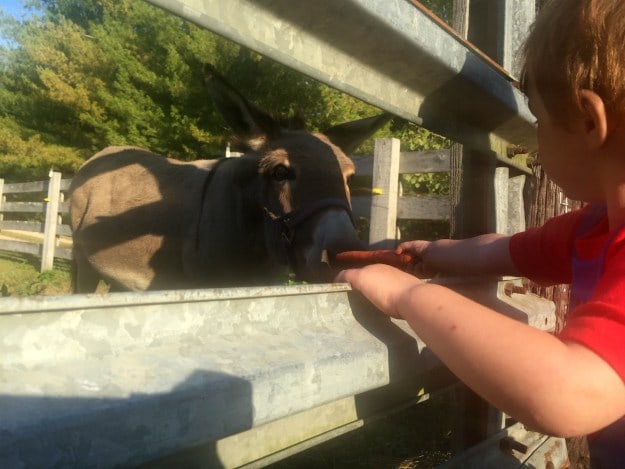
Miniature donkeys are a perfect hands-on training tool for children. They are docile and yearn to soak up all the affection which comes their way. Homesteading youngsters can easily learn how to care for, ride, halter, harness, and cart with these eager to please animals.
Typically mini donkeys can carry about 100 pounds on their back. Children up to a certain age can safely and humanely learn how to ride on the back of a miniature donkey. Purchasing or making a pack saddle is another superb way to make the most out of the mini donkey's work ability. Moving supplies about the homestead or survival retreat over terrain a cart cannot go could easily be accomplished by packing up to medium-weight loads on the back of miniature donkeys.
Like their larger counterparts and horses, miniature donkeys can founder, suffer from colic, require regular worming, and vaccinations. They should have their hooves trimmed about every eight to 12 weeks. There is no need to shoe the miniature donkeys unless they will be frequently ridden on pavement.
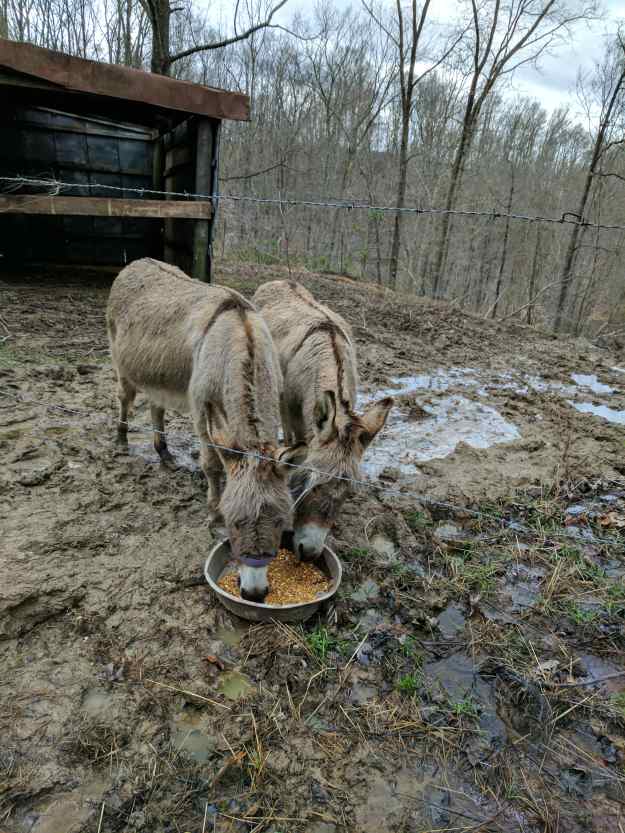
Mini donkeys are herd animals and should be allowed to share a stall of a 3-sided shelter with another of their breed or at least other friendly livestock. They can be kept in the same pasture and barn as standard-size donkeys and horses – they do not even mind communing with goats.
My bossy mare accepted our two mini donkeys into HER herd without incident. Sure, she ran them a good bit and blocked them from entering HER barn for several hours on day one – but my Ruby does that to every new addition.
A lonely and bored donkey could begin to act out an WILL bray loudly to register their displeasure when in a bad mood – or you are five minutes late for their feed. A half acre of land should provide a pair of miniature donkeys with enough pasture to suit their needs except during the winter months, depending upon the climate where the prepper retreat or homestead is located.
Breeding mini donkey could be another valuable way to make a steady stream of extra money from the homestead. As the animals become even more popular, the demand for both jennies and jacks will grow. All miniature donkeys have a dark brown cross shape which runs across their withers and down their back.
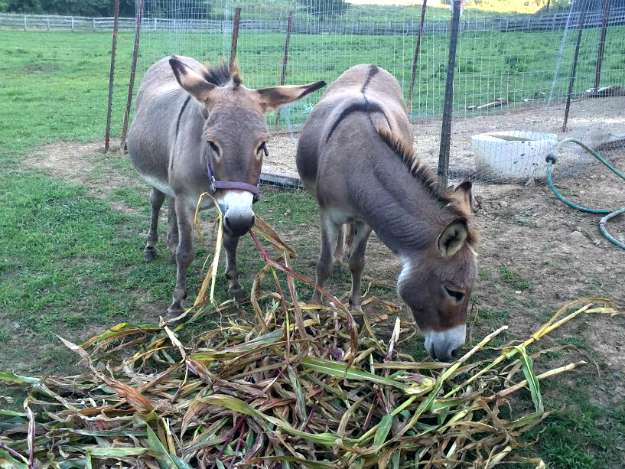
While gray dun is the most common color of miniature donkeys, they come in a plethora of other colors as well. Common coat colors also include black, white, or brown. The more unusual color, the higher the price tag – especially if you could garner an hard-to-find ivory mini donkey with blue eyes.
Miniature donkeys with a red or chestnut coat, roan, paint, or spotted paint or spotted pattern are unique but not as rare as an Ivory donkey and sell for significantly more than a typical gray mini donkey.
Animal Planet shows a video on pet 101 on mini donkeys:
The price per animal depends largely upon the local market. Jennies often garner more than jacks, especially if they are still young enough to breed. Typically a gray miniature donkey would sell for between $350 to $600 each. A breeding jennie could garner up to $2,000 depending on her personality and age. If the animal becomes registered with the International Miniature Donkey Registry or the Miniature Donkey Registry, the price could increase if being purchased by either a breeder or someone interested in showing the mini donkey.
Do you want a miniature donkey for your homestead? Let us know in the comments below.
You can also start teaching your children homesteading skills!

i want one. maybe two! so delightful!
We would love a pair! Working to acquire 13 acres this year, 8 of which is pasture. Additional information would be greatly appreciated, thank you…
We’ve been looking for a pair for a few years now without much success. We live in Utah with an orchard and can’t find much research about how the trees would fate. We also raise emus and aren’t sure of comparability. Thoughts?
Mini donkeys are too small to fight off a pack of dogs/wolves/coyote. Many have been killed because of people being mislead. Livestock guardian dogs are best. But donkeys are great pets, workers, and friends for homesteaders like myself. I have two standards and they are lovely.
We started out with five and now we have seven and love every one of them
We have had as many as 29 of these wonderful animals. Currently have 9, most are registered. They do run off stray dogs and bray at strangers to include the rare wandering coyote. We have several grays, but also paints, and several brown, even one NLP brown. Great pets!
We live on a 40 acre ranch with access to another 10 acres of pasture, during a grid-down scenario we are surrounded by an 2,800 acre cattle ranch, plenty of room and feed to support several livestock animals, and it’s all fenced & crossfenced. We are in the Sierra Nevada Foothills with annual grass so livestock must have an alternative food source, we usually feed with Alfalfa, Oats for the smaller breeds. We can sustain enough livestock to support several families for an extended period of time. I feel really bad for the folks in the cities, especially for those along the coastline, L.A., San Fran Bay Area and such. Even if they could find a place to grow a garden if would be small and they would need to spend considerable time, effort, and energy to defend their plot of land, good luck with that. Maybe the good decent folks on the coast should consider moving inland away from the fray, the bad guys are eventually going to take over everything there, I don’t care how well prepared they are, eventually they will be overrun by people they used to consider their friends, it’s amazing what someone will do, what someone will turn into, just so they can feed their children, I guess you can’t blame them and I’m glad and blessed to live where we do!!
Looks like a burro to me. What are the differences?
If only I did not live in town now, the worst curse for a country grown person. I would want one then.
we live off grid in Troy, Montana and I have a 6 year old grand daughter who would love a small donkey, where can I find her one?
I would love to have a pair
I live in Columbia MO looking for one or two
We want a mini donkey or two!!!
South of Rapid City and would love to start with a couple.
i just lost my male donkey I am looking for another one I would like one hat has a loud mouth that is what my other one had I loved it when I came home and he talked to me